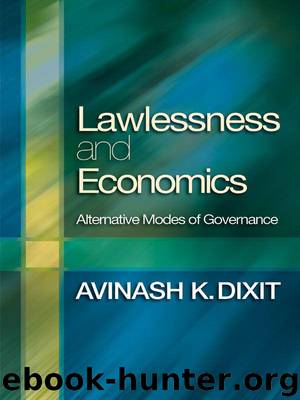Lawlessness and Economics: Alternative Modes of Governance by Avinash Dixit

Author:Avinash Dixit
Language: eng
Format: mobi, epub
Publisher: Princeton University Press
Published: 0101-01-01T00:00:00+00:00
In terms of the model of this chapter and the discussion of dynamics above, the difference can be understood as follows. Growth starting from a low level can be achieved using relation-based governance in small communities of traders with good relationships and information networks, so long as the state does not actually inhibit such developments with its policies. McMillan and Woodruff’s (1999) study of non-state governance in Vietnam illustrates this. But to go beyond the middle-income level requires greater integration into a large economy, where relation-based governance is inadequate. The necessary shift toward rule-based governance is more demanding because it must overcome the additional problems of collective action, vested interests and so on.
How might such investment in the framework of rules get made? An example suggests that private action may provide the lead that spurs collective public action. In 1898, when Elbert Gary and J. Pierpont Morgan started Federal Steel, they “took the then unusual step of issuing quarterly reports” because “both men believed that corporations issuing publicly traded securities had to account for their financial performance” (Strouse 2000, p. 398). At first there was no public process such as external audits to guarantee the truthfulness of these accounts; presumably Morgan’s own reputation and integrity, acquired in the prevailing relation-based system of finance, gave them credibility. But the public gradually found that inadequate, perhaps because others entering the arena of raising finance from the general public did not have the same reputation. A few years later, then president Theodore Roosevelt said that he would not “accept the publication of what some particular company chooses to publish as a favor, instead of demanding what we think ought to be published from all companies as a right” (Strouse 2000, p. 439). And still later, Morgan said that “business in the twentieth century would have to be conducted with glass pockets” (Strouse 2000, p. 600). This episode also serves to emphasize a point I made in the discussion of Section 2.5, namely the endogeneity of verifiability, and the value of making more information publicly verifiable. Cooter (1994, p. 216) gives other examples, historical and recent, of the process by which arrangements of governance in private voluntary associations are later adopted and enforced by the apparatus of state law.
Factors Undermining the Relation-Based System
Forces operate on the other side to undermine a relation-based system when it comes into contact with other rule-based systems. If capital-owners in the relation-based system become able to invest abroad under a rule-based system and earn the going return there, that will raise the outside opportunities of the participants in each ongoing repeated game of relation-based finance, and thereby unravel its tacit cooperation equilibrium. This may be happening in East Asia now. Similarly, as improvements in transportation technology or lowering of trade barriers with other countries, or liberalization of regulation within or across countries, bring a relation-based production system into contact with other economies and other markets, its firms will discover better opportunities outside their previous relationships; this can undermine the previous repeated game equilibrium.
Download
Lawlessness and Economics: Alternative Modes of Governance by Avinash Dixit.epub
This site does not store any files on its server. We only index and link to content provided by other sites. Please contact the content providers to delete copyright contents if any and email us, we'll remove relevant links or contents immediately.
Hit Refresh by Satya Nadella(9123)
The Compound Effect by Darren Hardy(8941)
Change Your Questions, Change Your Life by Marilee Adams(7757)
Nudge - Improving Decisions about Health, Wealth, and Happiness by Thaler Sunstein(7689)
The Black Swan by Nassim Nicholas Taleb(7105)
Deep Work by Cal Newport(7063)
Rich Dad Poor Dad by Robert T. Kiyosaki(6603)
Daring Greatly by Brene Brown(6501)
Principles: Life and Work by Ray Dalio(6415)
Playing to Win_ How Strategy Really Works by A.G. Lafley & Roger L. Martin(6227)
Man-made Catastrophes and Risk Information Concealment by Dmitry Chernov & Didier Sornette(6002)
Big Magic: Creative Living Beyond Fear by Elizabeth Gilbert(5754)
Digital Minimalism by Cal Newport;(5747)
The Myth of the Strong Leader by Archie Brown(5496)
The Slight Edge by Jeff Olson(5410)
Discipline Equals Freedom by Jocko Willink(5378)
The Motivation Myth by Jeff Haden(5203)
The Laws of Human Nature by Robert Greene(5171)
Stone's Rules by Roger Stone(5080)
